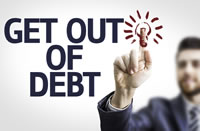What Is Bankruptcy
Bankruptcy Helpline
0800 368 8231
What Is Bankruptcy?
Bankruptcy is an option that often has to be considered when you cannot pay your debts as they fall due. A first time bankrupt with debts will generally receive their discharge one year after the date of the bankruptcy order.

Although bankruptcy has a bad stigma and is publicly advertised, it should always be considered when dealing with individual insolvency cases. However bankruptcy is just one of several options to be considered when you cannot repay your debts. If you are ever faced with the prospect of bankruptcy you should always look at alternatives as soon as possible such as an Individual Voluntary Arrangement or a Debt Management Plan.
Find out what debt help you qualify for?
Check nowJust take our FAST, FREE Online Assessment to see if you can be debt free in 2016!
Bankruptcy is one way of dealing with debts you cannot pay. The bankruptcy proceedings can:-
- free you from overwhelming debts so you can make a fresh start, subject to some restrictions
- make sure your assets are shared out fairly among your creditors.
How are you made bankrupt?
You can be made bankrupt either in one of three ways.
- Voluntarily Bankruptcy - you apply to become bankrupt yourself.
- Involuntarily Bankruptcy - A creditor you owe money (£5000 Minimum) applies for your bankruptcy
- Failed IVA - The supervisor or anyone bound by an IVA if the conditions of the IVA are not met.
A bankruptcy order can still be made even if you refuse to acknowledge the proceedings or refuse to agree to them. You should therefore co-operate fully once the bankruptcy proceedings have begun. If you dispute the creditor’s claim, you should try and reach a settlement before the bankruptcy petition is due to be heard. Trying to do so after the bankruptcy order is made is both difficult and expensive.
What are the implications of bankruptcy?
- You lose control of your assets.
- You cannot obtain credit for over £500 without the permission from the lender.
- You cannot act as a company director.
- You cannot take any part in the promotion, formation or management of a limited company (LTD) without the permission of the court.
- You cannot trade in any business under any other name unless you inform all persons concerned of the bankruptcy.
- You may not practice as a Charted Accountant / Lawyer.
- You may not act as a Justice of the peace (JP).
- You may not become an member of parliament.
- You may not become a member of the local authority.
- Your credit is affected for many years after the annulment.
- You may be publicly examined in court.
What are the advantages of bankruptcy?
- For the person involved, bankruptcy provides relative peace of mind and possible automatic discharge after one year (or less in some cases).
- For the creditors, bankruptcy allows a full investigation of the debtor's affairs to be carried out.
There are many long term disadvantages of Bankruptcy which need to be considered before you make your final decision.
N.B. Are you sure declaring bankruptcy is the only option?
But before you apply for bankruptcy make sure you're certain you've considered the following questions:
Need Bankruptcy Advice?
Our panel of specialists can quickly advise you on what to do if you are considering going bankrupt. Simply call the team FREE on 0800 368 8231.
Alternatively take the online bankruptcy test and check if you qualify.
How To Deal With Debt Collectors
Have you received a letter or call from a debt collection agency. In this guide we'll expain how to deal with debt collectors...
A Guide To An Attachment of Earnings Order
Have you received a letter threatening an attachment of earnings. In this guide we explore what an attachment of earnings order is, how they work and how to defend...






